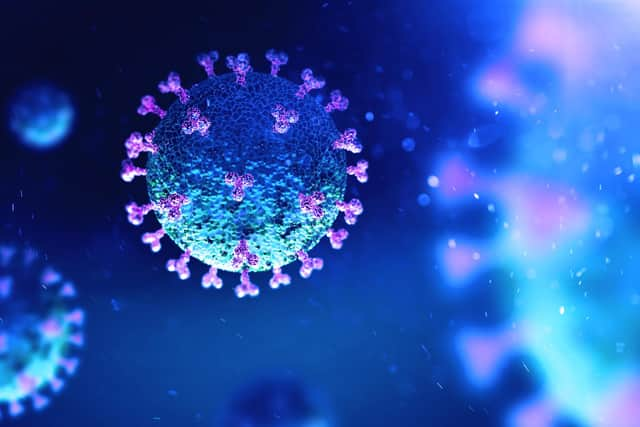Hope for new Scottish drug which shows promise in fight against Covid-19
Pneumagen, a University of St Andrews spin-out company, carried out three separate in-vitro studies into preventing coronavirus infections, including Sars-CoV-2 infection, the cause of Covid-19, using Neumifil and multivalent Carbohydrate Binding Modules (mCBMs) generated using its GlycoTarge technology.
The successful studies involved both treating infection and blocking new infections.
Advertisement
Hide AdAdvertisement
Hide AdWorking closely with Public Health England's Porton facility and, separately, the University of Glasgow's MRC Centre for Virus Research, Pneumagen tested the activity of its mCBMs against coronaviruses using plaque reduction tests.


At both Porton and the University of Glasgow, the mCBMs were found to reduce the number of Sars-CoV-2 plaques in these tests when the mCBMs were used in both prevention and treatment of infection.
Pneumagen now wants to begin clinical testing for the prevention and treatment of Covid-19.
Chief executive Douglas Thomson said: "Today's positive results from in-vitro studies of our mCBMs against coronaviruses show that glycan binding has the potential to prevent and treat infection.
"This further supports the value of our universal therapeutic modality to block access to lung cells of Sars-CoV-2, as well as other viruses, that cause respiratory tract infections, providing the potential for a pan-viral respiratory product.
"Our goal is now to rapidly begin clinical testing for the prevention and treatment of Covid-19."
Neumifil, Pneumagen's lead mCBM, is already being developed for the universal treatment of respiratory tract infections (RTIs) including Influenza Virus (IFV), Respiratory Syncytial Virus (RSV), and now coronaviruses.
Scientists said Neumifil's novel mechanism of action, masking glycan receptors in patients' airways and thereby preventing the entry of the virus, has the potential to revolutionise the treatment of RTIs by providing clinicians with the opportunity to offer patients total protection against any circulating viral strain.
A message from the Editor:
Advertisement
Hide AdAdvertisement
Hide AdThank you for reading this story on our website. While I have your attention, I also have an important request to make of you.
With the coronavirus lockdown having a major impact on many of our advertisers - and consequently the revenue we receive - we are more reliant than ever on you taking out a digital subscription.
Subscribe to scotsman.com and enjoy unlimited access to Scottish news and information online and on our app. With a digital subscription, you can read more than 5 articles, see fewer ads, enjoy faster load times, and get access to exclusive newsletters and content. Visit https://www.scotsman.com/subscriptions now to sign up.
Our journalism costs money and we rely on advertising, print and digital revenues to help to support them. By supporting us, we are able to support you in providing trusted, fact-checked content for this website.
Frank O'Donnell
Editorial Director
Comments
Want to join the conversation? Please or to comment on this article.